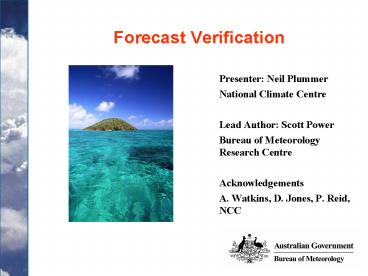Forecast Verification - PowerPoint PPT Presentation
1 / 26
Title:
Forecast Verification
Description:
all have special meanings in statistics. Accuracy ... so it is a very accurate scheme! or is it? ... Increase access to verification information. Simplify ... – PowerPoint PPT presentation
Number of Views:30
Avg rating:3.0/5.0
Title: Forecast Verification
1
Forecast Verification
- Presenter Neil Plummer
- National Climate Centre
- Lead Author Scott Power
- Bureau of Meteorology Research Centre
- Acknowledgements
- A. Watkins, D. Jones, P. Reid, NCC
2
Introduction
- Verification - what it is and why it is
important? - Terminology
- Potential problems
- Comparing various measures
- Assisting users of climate information
3
What is verification?
- check truth or correctness of
- process of determining the quality of forecasts
- objective analysis of degree to which a series
of forecasts compares and contrasts with the
equivalent observations of a given period
4
Why bother with verification?
- Scientific admin support
- is a new system better?
- assist with consensus forecasts
- Application of forecasts
- how good are your forecasts?
- should I use them?
- can be used to help estimate value
5
Terminology can be confusing
- Verification is made a little tricky by the fact
that everyday words are used to describe
quantities with a precise statistical meaning.
Common words include - accuracy
- skill
- reliability
- bias
- value
- hit rates, percent consistent, false alarm rate,
... - all have special meanings in statistics
6
Accuracy
- Average correspondence between forecasts and
observations - Measures
- mean absolute error, root mean square error
7
Bias
- Correspondence between average forecast with
average observation - e.g. average forecast - average value of
observation
8
Skill
- Accuracy of forecasts relative to accuracy of
forecasts using a reference method (e.g.
guessing, persistence, climatology, damped
persistence, ) - Measures
- numerous!
9
Reliability
- Degree of correspondence between the average
observation, given a particular forecast, and
that forecast taken over all forecasts - e.g. suppose forecasts of 10 or 30 or , ,
or 70 or chance of rain tomorrow are
routinely issued for many years - if we go back through all of the forecasts issued
a forecast of looking for occasions when forecast
probability of 70 was issued, then we would
expect to find rainfall on 70 of occasions if
the forecast system is reliable - this is often not the case
10
Reliability Graph
11
Value
- Impact that prudent use of a given forecast
scheme has on the users profits, COMPARED WITH
profits made using a reference strategy - Measures
- , lives saved, disease spread reduced,
12
Contingency Table
OBSERVED
HIT RATE Hits/(Hits Misses) FALSE
ALARM RATE False Alarms/(False Alarms Correct
Rejections) PERCENT CONSISTENT
100(HitsCorrect Rejections)/Total
13
Accuracy measures
- Hit rates
- Proportion of observed events correctly forecast
- False alarm rates
- Proportion of observed non-events forecasted as
events - Percent Correct
- 100x (proportion of all forecasts that are
correct)
14
1. Forecast performance2x2 contingency table
15
Is this a good scheme?
- 1. Original Scheme
- Percent correct 100(28 2680)/2803
- 96.6
- so it is a very accurate scheme!
- or is it?
16
2. Performance of 2nd (reference) forecast
method never predict a tornado a lazy
forecast scheme!
17
Performance measures
Percent Correct
- 1. Original Scheme
- Percent correct 100(28 2680)/2803
- 96.6
- 2. Reference Lazy Scheme
- Percent correct 100(0 2752)/2803
- 98.2 !!
18
Performance measures
- Hit rates
- ) 28/51 so over half the tornadoes predicted
- ) reference scheme 0/51 no tornadoes
predicted
19
Value
- Suppose an unexpected (unpredicted) tornado
causes 500 million damage and that an expected
(predicted) tornado results in only 100 million
damage - So forecast scheme (1) saves 28 x 400 million
compared to forecast scheme (2) - a huge saving - highly valuable!!
20
(No Transcript)
21
(No Transcript)
22
Categorical versus probabilistic
- Categorical
- The temperature will be 26ºC tomorrow
- Probabilistic
- There is a 30 chance of rain tomorrow
- There is a 90 chance that wet season rainfall
will be above median
23
Artificial Skill
- danger of too many inputs
- danger of trying too many inputs
- independent data
- cross-validation
- importance of supporting evidence
- simple plausible hypothesis
- climate models
- process studies
24
How do users verify predictions?
- No single answer, however
- some switch from probabilistic to categorical
- media prefer categorical forecasts
- assessments made on a single season
- extrapolation
25
How can we assist users in verification
- Increase access to verification information
- Simplify information
- Build partnerships
- media
- users user groups
- other government departments
- Education (booklets, web, )
26
Summary
- Verification is crucial but care is needed!
- Familiarise with terminology used
- skill, accuracy, value,
- No single measure tells the whole story
- Importance of using independent data in
verification - Keep it simple
- Communicating verification results is challenging
- Users sometimes do their own verification -
sobering - Most people like to think categorically -
challenging - Dialogue with end-users is very important































